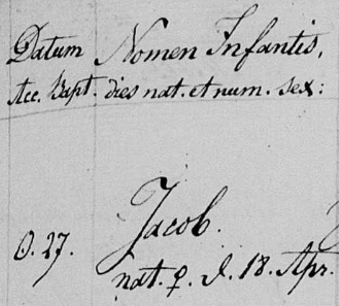Astrological Symbols in Genealogical Documents
I was recently working on a project and I came across baptism records that had multiple symbols. At first, I didn’t pay much attention, but the one for Jacob caught my eye because under Jacob’s name, there was the symbol for Venus ♀, which is typically used as a symbol for females. I looked through the pages, and each name had a symbol under it, but it wasn’t always the same symbol, and it didn’t seem to have anything to do with male or female. I asked someone else to look at it and give her opinion of what the symbols meant and she said she thought they represented the days of the week. After a quick google search, I completely agreed!

And thus began my rabbit hole of learning about astrology and symbols.
Latin Roots
The first thing to note is that the baptism register was written in Latin. I had previously seen “Gemini” written in English parish registers when referring to twins, and as Gemini is the Latin word for twins, I wondered if the Latin translations of the days of the week would provide more clues.
As I translated each day of the week, it was easy to see why astrological symbols made their way into these church records. For instance, Monday is Lunae, which is very similar to lunar, meaning relating to or resembling the moon. The translation for Thursday (Lovis) was the only one that didn’t mean anything to me. Apparently, Lovis and Jovis were often used interchangeably and Jovis is the Latin word for Jupiter. The chart below shows the Latin translation, its associated astrological meaning, and the symbol.
| Day of the week | Latin translation1 | Astrological meaning | Symbol2 |
|---|---|---|---|
| Monday | dies Lunae | Moon | ☾ or ☽ |
| Tuesday | Martis | Mars | ♂ |
| Wednesday | Mercurii | Mercury | ☿ |
| Thursday | Lovis | Jupiter | ♃ |
| Friday | Verneris | Venus | ♀ |
| Saturday | Saturni | Saturn | ♄ |
| Sunday | Solis | Sun | ☉ |
I was able to confirm this theory by determining the day of the week multiple dates fell on, and the corresponding symbols matched the astrological symbol for the day of the week. For instance, Jacob in the example above, was born 18 April 1828 and baptized 27 April. The 18th was a Friday, as represented by the symbol of Venus ♀ and he was baptized on Sunday the 27th, as represented by the symbol for the sun ☉.3
Below is a portion of a page from an 1822 baptism register in Basel, Switzerland and five of the symbols can be seen.4 The symbol for Mercury (Wednesday) was written with a closed 8 over the cross, rather than an open half-circle, but other than that, the symbols are fairly close.

The origin for the days of the week are not as obvious with the English words. But knowing they were named after the sun, the moon, and several planets, it is easier to see. I was surprised to see the symbols in a church register. I had not seen it before. I suspect it was more common in early documents, especially those written in Latin. The baptism books for St. Theodor, the church in Switzerland where this record was found, started including the astrological symbols in 1768. The handwriting looks slightly different than the entries before and it could have been the transition to a new clerk or clergyman and the tradition continued for the rest of that record book and the next. A new record book began in 1836 and the astrological symbols were no longer included. Not sure the initial intention for adding the symbols, but they add an interesting flare to these genealogical records.
| Monday | ☾ or ☽ | Friday | ♀ |
| Tuesday | ♂ | Saturday | ♄ |
| Wednesday | ☿ | Sunday | ☉ |
| Thursday | ♃ |
-
Translations were obtained using Google Translate. ↩
-
https://www.timeanddate.com/calendar/?year=1828&country=10 ↩
-
Baptism Register for Saint Theodor’s Church, Basel, Switzerland, 1822, p.377; digital image, Family Search (www.familysearch.org: accessed 22 June 2023). ↩

Comments
Comments powered by Talkyard.